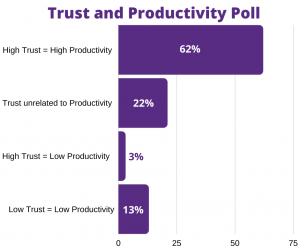Get in touch with us today!
If you have any questions, enquiries or just want to say how much you like us (or what we can do better), please drop us a line.
It is interesting, and I would argue rather disappointing to see that more and more organisations are demanding that their people go back to work five days a week. Google started gently and is now forcing workers back to the office and only last week  Amazon was the latest in a line of tech firms announcing this. Sir Cary Cooper, the eminent professor of organisational psychology and health at Manchester Business School has accused these firms of being the “dinosaurs of our age” by perpetuating “The old command and control management style”. He goes on to state that “If you value and trust people to get on with their job and give them autonomy – they’ll work better and you’ll retain them.”
Amazon was the latest in a line of tech firms announcing this. Sir Cary Cooper, the eminent professor of organisational psychology and health at Manchester Business School has accused these firms of being the “dinosaurs of our age” by perpetuating “The old command and control management style”. He goes on to state that “If you value and trust people to get on with their job and give them autonomy – they’ll work better and you’ll retain them.”
So why are businesses reverting back to the dark ages and demonstrating that they don’t trust their people enough to continue to work flexibly? It is clear that times are tough, everyone needs to maximise productivity but is pulling everyone back into the office, demonstrating such a lack of trust really the way to go?
In a recent episode on the HR Uprising podcast we explored the topic of trust with Adam Horne who is co-found of the Open Org Community, pretty much the antithesis of dinosaurs demanding 5 days a week in the office. They believe that trust stems from transparent leadership and this should be culture that we all strive to develop in our organisations. They believe that working flexibly and remotely can drive increased productivity, within the right leadership and management culture.
Now, we may be forgiven for thinking that trusting people to work effectively remotely was purely a product of the pandemic but Stephen Covey Snr and Stephen M.R. Covey (his son) have both written extensively on the importance of trust. In fact I wonder whether Amazon or Google have considered Stephen M.R.Covey’s concept of a “Trust Tax vs Trust Dividend” in his book ‘The Speed of Trust’ (2008).
This introduces the idea that in low-trust environments, everything takes longer and costs more, which he calls a “Trust Tax.” Conversely, high-trust environments yield a “trust dividend” with greater efficiency and effectiveness. I guess only time will tell for those companies driving 5 days a week in the office.
Certainly, 120 participants who took part in an Actus webinar were of the Covey view that High Trust leads to high productivity and vice versa.

Trust is the foundation of all successful relationships, with low trust in a remote working environment. Concerns are magnified without the fake reassurance of being able to physically see people throughout the working day. However, this lack of visibility should not mean that managers resort to micromanagement. Often this only exacerbates the issue.
We trust those who meet our expectations time and time again. But how can this trust be achieved if those expectations are not clear in the first place? The best start to building trust is to be open and honest about organisational and role expectations from the outset. From here, you can co-create objectives with clear agreed milestones, deliverables and timelines that are documented by the individual. This not only provides clarity to the individual but will also provide visibility of which work has been completed, without the dreaded micromanagement. Find out more about how to write SMART objectives in our free white paper here.
Now that you have clearly defined goals, you can move the focus from input to outputs. Use statements like ‘I don’t expect you to be nailed to your desk 9-5. I just trust you to get the job done well’. Most people will pay back this trust in goodwill and increased productivity.
Leaders can empower employees to perform by being available for support and encouraging them to ask questions if needed. Utilise Skype or similar for quick responses but encourage a call if they sense confusion or radio silence.
It is crucial that we encourage a culture of personal responsibility and accountability, where it is safe to own mistakes. If mistakes are made, managers should use coaching skills that to allow the individual to grow and learn. Such as asking what they could do differently next time.

Most importantly, we should recognise great performance and share with the team or through wider forums. Focus on recognising great outputs in the form of results rather than inputs, in the form of presenteeism.
Personally, I think that the Google and Amazon approach is a pretty blunt stick to use that is likely to risk losing talent and engagement. If staff are not being productive working remotely, have these businesses considered what really drives engagement and productivity? It certainly isn’t being in an office 5 days a week! I would love to know whether they have invested in upskilling their managers. To agree clear goals and give regular feedback – behaviours that are proven to increase productivity. For businesses that we consider to be digital leaders, it seems that the insight into the leadership behaviours and culture that truly drives productivity, engagement and retention is sadly lacking.
Part of our ethos is to help build a better workplace for people. We achieve this through great performance management software, the HR Uprising Podcast, and a variety of free thought leadership resources.
We also have a team of organisational development consultants who are on-hand to help meet your needs for culture change. If you would like to find out more about this service, why not get in touch by contacting us here.
Please see below for more additional resources on this topic:
Infographic: Building Trust as a Remote Manager
White Paper: Managing Underperformance in a virtual world
Listen for more on the HR Uprising Podcast with these episodes:
The Trust Crisis and How to Address It – With Adam Horne
Please complete the details to receive a 3 minute system tour direct to your inbox!
If you are looking for performance management software for 1000+ employees get in touch for a quote today.
Talk to one of our partnership specialists today.
Fill in your details below and then please check your email for a link to the 3 minute overview of Actus Software
If you have any questions, enquiries or just want to say how much you like us (or what we can do better), please drop us a line.